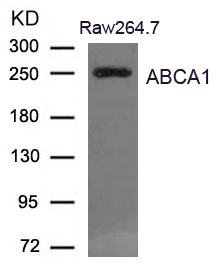
| WB | 咨询技术 | Human,Mouse,Rat |
| IF | 咨询技术 | Human,Mouse,Rat |
| IHC | 咨询技术 | Human,Mouse,Rat |
| ICC | 技术咨询 | Human,Mouse,Rat |
| FCM | 咨询技术 | Human,Mouse,Rat |
| Elisa | 咨询技术 | Human,Mouse,Rat |
| Aliases | TGD; ABC1; CERP; ABC-1; |
| Entrez GeneID | 19; |
| WB Predicted band size | 254kDa |
| Host/Isotype | Rabbit IgG |
| Antibody Type | Primary antibody |
| Storage | Store at 4°C short term. Aliquot and store at -20°C long term. Avoid freeze/thaw cycles. |
| Species Reactivity | Human,Mouse,Rat |
| Immunogen | Peptide sequence around aa.2253~2257(D-E-K-V-K) derived from Human ABCA1. |
| Formulation | Purified antibody in PBS with 0.05% sodium azide. |
+ +
以下是3-4条关于ABCA1抗体的参考文献及其摘要概括:
1. **"Role of ABCA1 in cellular cholesterol efflux and reverse cholesterol transport"**
*Authors: Smith, J.D., et al. (2000)*
**摘要**: 该研究利用特异性ABCA1抗体通过Western blot和免疫荧光技术,证实ABCA1蛋白在肝细胞和巨噬细胞中的表达与其介导的胆固醇流出能力直接相关,为ABCA1在胆固醇逆向转运中的核心作用提供了实验证据。
2. **"Immunohistochemical localization of ABCA1 in atherosclerotic plaques"**
*Authors: Tangirala, R.K., et al. (2002)*
**摘要**: 通过免疫组化技术结合ABCA1抗体,研究发现动脉粥样硬化斑块中的巨噬细胞和泡沫细胞高表达ABCA1.提示其在斑块稳定性及胆固醇代谢中的潜在调控机制。
3. **"ABCA1 mutations alter antibody detection and protein stability in Tangier disease"**
*Authors: Haidar, B., et al. (2004)*
**摘要**: 研究使用多种ABCA1抗体分析Tangier病患者突变蛋白的表达,发现部分抗体因表位缺失无法识别突变体,强调了抗体选择在遗传性ABCA1功能缺陷研究中的重要性。
4. **"ABCA1 and HDL biogenesis: a review of molecular mechanisms"**
*Authors: Yokoyama, S. (2005)*
**摘要**: 综述总结了ABCA1在HDL形成中的分子机制,并讨论了不同抗体在检测细胞膜定位、蛋白质相互作用及功能研究中的技术应用与局限性。
---
以上文献涵盖ABCA1抗体的实验应用(如Western blot、免疫荧光、免疫组化)及其在疾病机制研究中的价值,部分研究还强调了抗体选择对实验结果的影响。
The ABCA1 (ATP-binding cassette transporter A1) antibody is a key tool for studying the role of ABCA1. a membrane protein critical for cellular cholesterol and lipid homeostasis. ABCA1 facilitates the efflux of cholesterol and phospholipids to apolipoproteins like ApoA-1. initiating the formation of high-density lipoprotein (HDL). Dysregulation of ABCA1 is linked to metabolic disorders, including Tangier disease (caused by ABCA1 mutations), atherosclerosis, and neurodegenerative conditions like Alzheimer’s disease.
ABCA1 antibodies are widely used in research to detect protein expression, localization, and function in tissues or cells. They enable investigations into ABCA1’s role in reverse cholesterol transport, immune responses, and amyloid-beta clearance in the brain. Common applications include Western blotting, immunohistochemistry, flow cytometry, and immunofluorescence. Both monoclonal and polyclonal variants exist, with monoclonal antibodies offering higher specificity and polyclonal antibodies providing broader epitope recognition.
Studies using ABCA1 antibodies have advanced understanding of its transcriptional regulation (e.g., via LXR/RXR pathways), post-translational modifications, and interactions with signaling molecules. These insights inform therapeutic strategies targeting ABCA1 to modulate HDL levels or mitigate diseases like cardiovascular disorders. However, antibody validation remains crucial, as cross-reactivity or batch variability can affect reproducibility. Overall, ABCA1 antibodies are indispensable for elucidating lipid metabolism mechanisms and developing related therapies.
×